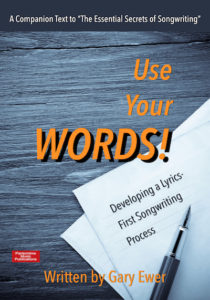If you involve yourself in any sort of physical activity, there is no doubt that you’re familiar with the phrase “listen to your body.”
It’s a phrase that is meant to caution you against overdoing it. If you’re a runner and you suddenly encounter some sort of injury, you’ll hear someone say, “Listen to your body. It’s trying to tell you to slow down and perhaps stop, at least for the moment.”
 Are you trying to make your lyrics more important in your songwriting process? This eBook can help: “Use Your Words! Developing a Lyrics-First Songwriting Process.” Take advantage of this FREE offer.
Are you trying to make your lyrics more important in your songwriting process? This eBook can help: “Use Your Words! Developing a Lyrics-First Songwriting Process.” Take advantage of this FREE offer.
It’s good advice. Exercising with an injury can worsen things, and the fear is that the injury, which might be minor, can become something much worse, perhaps chronic and permanent.
In the arts, you might also deal with the “listen to your body” scenario, although it’s not a muscle that causes problems — it’s your creative mind. As a songwriter, there are times when you just can’t seem to get anything sounding good.
So what do you do when your imagination just isn’t coming up with anything useful, and it’s been going on for a few days?
It might be time to take a page from an athlete’s book, and “listen to your creative mind.” It may be telling you that it simply needs a rest.
I’m a fan of working through a creative block. Just because you’ve struggled for an hour and come up with nothing does not mean that you’re in the throes of writer’s block.
But there are times when it does a lot of good to listen to your creative mind and take a break.
Athletes will often turn to a different sport, one that uses a different set of muscles, and as a musician you can do something similar: you can turn your attention to other musical activities, ones that don’t require you to write music.
In most cases, turning your attention away like that will be all your imagination needs, and you’ll be back in the writing groove before you know it.
So concentrating on playing, producing for someone else, writing poetry, or attending concerts keeps your head in a musical space, and keeps things positive. In no time you’ll find your head filling up with ideas again, and you should be back to writing within days.
 Written by Gary Ewer. Follow Gary on Twitter
Written by Gary Ewer. Follow Gary on Twitter
If you’re ready to study — to learn why a great song succeeds — and then to apply those discoveries to your own songs, you’re ready for “The Essential Secrets of Songwriting 10-eBook Bundle.” Comes with a Study Guide.










